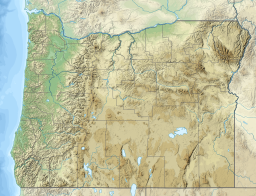John C. Boyle Reservoir
| John C. Boyle Reservoir | |
|---|---|
 Boyle Reservoir | |
| Location | Klamath County, Oregon |
| Coordinates | 42°08′24″N 122°02′01″W / 42.14000°N 122.03361°W |
| Type | Reservoir, eutrophic |
| Primary inflows | Klamath River |
| Primary outflows | Klamath River |
| Catchment area | 4,080 square miles (10,600 km2) |
| Basin countries | United States |
| Surface area | 381 acres (154 ha) |
| Average depth | 11 feet (3.4 m) |
| Max. depth | 45 feet (14 m) |
| Water volume | 4,200 acre-feet (5,200,000 m3) |
| Residence time | < 1 week |
| Shore length1 | 7.6 miles (12.2 km) |
| Surface elevation | 3,796 feet (1,157 m) |
| Settlements | Keno, Klamath Falls |
| References | [1][2][3] |
| 1 Shore length is not a well-defined measure. | |
John C. Boyle Reservoir is an artificial impoundment behind John C. Boyle Dam on the Klamath River in the U.S. state of Oregon. The lake is 16 miles (26 km) west-southwest of Klamath Falls along Oregon Route 66.[1]
The dam is at about river mile (RM) 225 or river kilometer (RK) 362, about 10 miles (16 km) by river downstream of the community of Keno.[4] Spencer Bridge carries the highway over the lake at about its midpoint.[4]
Water from the reservoir is diverted through a sluice to the Boyle Powerhouse, about 5 miles (8 km) downstream of the dam.[5] Fluctuations of up to 3 feet (0.9 m) daily in the reservoir level occur as water is added for storage or diverted for power generation.[6]
History
[edit]The California–Oregon Power Company (COPCO), which later merged with Pacific Power, a future subsidiary of PacifiCorp, built the dam in the mid-1950s as part of the multi-dam Klamath River Hydroelectric Project.[7] Meant primarily to generate hydroelectricity, the reservoir can hold up to 4,200 acre-feet (5,200,000 m3) of water.[1] Originally called Big Bend Reservoir, it was renamed in 1962 for John C. Boyle, COPCO's vice president, general manager, and chief engineer.[7]
The Boyle dam is one of four Klamath River dams that may be removed as early as 2020 if the United States Congress eventually agrees.[8] The other three, all owned by PacifiCorp and all in California, are Iron Gate, Copco 2, and Copco 1.[9] A tentative agreement reached in 2009 by major stakeholders, including PacifiCorp, would remove the dams to restore salmon runs blocked below Iron Gate for about a century.[9]As of February 25, 2022, the FERC released their final Environmental Impact Statement (EIS) on the dam's removal.[10] The dam is expected to be removed sometime in 2023 or 2024.[11]
It is named after John C. Boyle (1899-1979), who was vice president, general manager, and long-time chief engineer of the California Oregon Power Company (COPCO), a privately held utility that served southern Oregon and portions of northern California.[12]
Recreation
[edit]The reservoir supports largemouth bass ranging from 12 to 16 inches (30 to 41 cm), which can be fished for by boat or from the bank.[6] Other fish found in the lake include black crappie, white crappie, yellow perch, brown bullhead, and pumpkinseed sunfish.[6]
Topsy Recreation Site, maintained by the Bureau of Land Management, has a campground, a boat launch, a dock, and a fishing pier at J. C. Boyle Reservoir. Swimming, picnicking, and bird-watching are among recreational activities in addition to camping and fishing.[13][14]
See also
[edit]References
[edit]- ^ a b c Johnson, Daniel M.; Petersen, Richard R.; Lycan, D. Richard; Sweet, James W.; Neuhaus, Mark E., and Schaedel, Andrew L. (1985). Atlas of Oregon Lakes. Corvallis: Oregon State University Press. p. 214. ISBN 0-87071-343-4.
{{cite book}}: CS1 maint: multiple names: authors list (link) - ^ "Atlas of Oregon Lakes: John C. Boyle Reservoir (Klamath County)". Portland State University. 1985–2012. Retrieved January 7, 2013.
- ^ "John C. Boyle Reservoir". Geographic Names Information System. United States Geological Survey. May 22, 1986. Retrieved January 7, 2013.
- ^ a b United States Geological Survey (USGS). "United States Geological Survey Topographic Map". TopoQuest. Retrieved January 7, 2013. The relevant quadrangle is Spencer Creek.
- ^ Sheehan, Madelynne Diness (2005). Fishing in Oregon: The Complete Oregon Fishing Guide (10th ed.). Scappoose, Oregon: Flying Pencil Publications. pp. 274–76. ISBN 0-916473-15-5.
- ^ a b c Sheehan, p. 259
- ^ a b Kramer, George. "John C. Boyle (1887–1979)". The Oregon Encyclopedia. Portland State University. Retrieved January 7, 2013.
- ^ Burns, Ryan (December 27, 2012). "Top 10: Klamath Dam Removal Plan Stalls Out". The Journal. Eureka, California: The North Coast Journal Weekly of Politics, People & Art. Retrieved January 7, 2013.
- ^ a b Fimrite, Peter (September 30, 2009). "Deal to Raze 4 Klamath Dams". San Francisco Chronicle. Hearst Communications. Retrieved January 7, 2013.
- ^ "FERC Staff Issues the Draft Environmental Impact Statement for the Hydropower License Surrender and Decommissioning of the Lower Klamath Project No. 14803 (P-14803-001) | Federal Energy Regulatory Commission". www.ferc.gov. Retrieved 2022-04-30.
- ^ "Major hurdle cleared in plan to demolish 4 Klamath River dams". opb. Retrieved 2022-04-30.
- ^ "John C. Boyle (1887-1979)".
- ^ "Topsy Recreation Site". Bureau of Land Management. Retrieved January 7, 2013.[permanent dead link]
- ^ "Topsy Campground, Oregon". Public Lands Information Center. Retrieved January 7, 2013.


